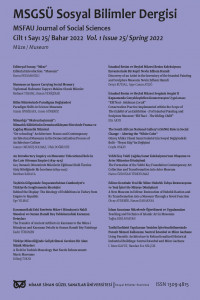Ottoman Greeks who Studied and Transcribed Ottoman Turkish Music: The Case of Nilevs Kamarados
Nilevs Kamarados (1847-1922) was an Ottoman Greek musician and music teacher who was highly respected both during his lifetime and after his death. He was a performer and theorist of Byzantine music (Greek Christian Orthodox Ecclesiastical music), but he also studied Western, Ottoman Turkish, Greek folk, and Armenian music. The archive he left behind is of particular interest, since it contains testimonies of his involvement with all these musical genres: publications, musical transcriptions in Byzantine, staff and Hamparsum notation, drafts, and notes on theoretical subjects. Kamarados’s archive is now part of the Greek Music Archive of the Music Library of Greece “Lilian Boudouri”. The aim of this study is to present Kamarados’s association with Ottoman Turkish music, as it is highlighted by his archive, while providing catalogs with the corresponding transcriptions in Byzantine and staff notation found there, as well as a catalog with the transcriptions of song lyrics in Karamanlidika (Turkish language written with the Greek alphabet).
Anahtar Kelimeler:
Nilevs Kamarados, Ottoman Greeks, Musical Transcriptions of Ottoman Turkish Music, Ottoman Turkish Music in Greece, Musical Archive
Ottoman Greeks who Studied and Transcribed Ottoman Turkish Music: The Case of Nilevs Kamarados
Nilevs Kamarados (1847-1922) was an Ottoman Greek musician and music teacher who was highly respected both during his lifetime and after his death. He was a performer and theorist of Byzantine music (Greek Christian Orthodox Ecclesiastical music), but he also studied Western, Ottoman Turkish, Greek folk, and Armenian music. The archive he left behind is of particular interest, since it contains testimonies of his involvement with all these musical genres: publications, musical transcriptions in Byzantine, staff and Hamparsum notation, drafts, and notes on theoretical subjects. Kamarados’s archive is now part of the Greek Music Archive of the Music Library of Greece “Lilian Boudouri”. The aim of this study is to present Kamarados’s association with Ottoman Turkish music, as it is highlighted by his archive, while providing catalogs with the corresponding transcriptions in Byzantine and staff notation found there, as well as a catalog with the transcriptions of song lyrics in Karamanlidika (Turkish language written with the Greek alphabet).
Keywords:
Nilevs Kamarados, Ottoman Greeks, Musical Transcriptions of Ottoman Turkish Music, Ottoman Turkish Music in Greece, Musical Archive,
___
- Anagnostopoulou, S. (2010). The ‘Nation’ of the Rum sings of its sultan: The many faces of Ottomanism. In L. Tanatar Baruh, & V. Kechriotis (Eds.). Economy and Society on both shores of the Aegean (pp. 79-105). Athens: Historical Archives of Alpha Bank.
- Andrikos, N. (2012). Τουρκόφωνοι πολυχρονισμοί και άσματα εγκωμιαστικά στον σουλτάνο Abdülhamit τον Β΄, μελοποιημένα από εκκλησιαστικούς συνθέτες [=Polyhcronismoi and celebratory songs for Sultan Abdülhamit the 2nd in Turkish language, set in music by composers of Greek eccleciastical music]. Moussikos Loghos. Musicological Periodical Edition of the Department of Music Studies of the Ionian University (10), pp. 5-18. [In Greek]
- Andrikos, N. & Papadopoulos, G. (2021). Reading between the “music lines”: Methodological challenges in approaching Greek notated musical collections. Intercommunal musical geographies of late Ottoman Istanbul (International Conference, 29 October 2021). Athens: Laboratory of Ethnomusicology and Cultural Anthropology, Department of Music Studies, School of Philosophy, National and Kapodistrian University of Athens.
- Apostolopoulos, T. & Kalaitzidis, K. (2019). Rediscovered musical treasures. Exegeses of secular Oriental music. Bucureşti: Editura Universităţii Naţionale de Musică Bucureşti.
- Bardakçı, M. (1993). Fener beyleri’ne Türk şarkıları. İstanbul.
- Behar, C. (2006). The Ottoman musical tradition. In S. N. Faroqhi (Ed.). The Cambidge History of Turkey: The later Ottoman Empire, 1603-1839 (Vol. 3, pp. 393-407). Cambridge: Cambridge University Press.
- Chaldæakes, A. Loupas, S. & Chaldæaki, E. (2021). Historico-musicological aspects of K. A. Psachos’s Archive. Musicologist, 5 (2), pp. 187-239.
- Chaldæaki, E. (2022a). Η δημοτική μουσική στις τουρκόφωνες και ελληνόφωνες μουσικές συλλογές της ύστερης οθωμανικής περιόδου: λαϊκός πολιτισμός και διακοινοτικές σχέσεις [Folk music in the Turkish and Greek musical collections of late Ottoman era: Popular culture and intercommunal relations] [Unpublished doctoral dissertation]. Athens: National and Kapodistrian University of Athens.
- Chaldæaki, E. (2022b). Testimonies of Ottoman Turkish music in K. A. Psachos’s personal archive. Yegah Musicology Journal, 5 (2), pp. 202-236.
- Kalaitizidis, K. (2012). Post-Byzantine music manuscripts as a source for Oriental secular music (15th to Early 19th century). (K. Koubaroulis & D. Koubaroulis, Trans..). Würzburg: Egon Verlag Würzburg.
- Kamarados-Vyzantios, G. D. (1976). Βιογραφία Νηλέως Καμαράδου, μουσικοδιδασκάλου [=Biography of Nivels Kamarados, a music teacher]. Athens. [In Greek]
- Nilevs Kamarados’s Archive. Greek Music Archive, Music Library of Greece “Lilian Boudouri”.
- Nilevs Kamarados’s Digitized Archive. Digital Collections, Music Library of Greece “Lilian Boudouri”, mmb.org.gr/el/digital-collections.
- ISSN: 1309-4815
- Yayın Aralığı: Yılda 2 Sayı
- Başlangıç: 2010
- Yayıncı: Mimar Sinan Güzel Sanatlar Üniversitesi
Sayıdaki Diğer Makaleler
Ottoman Greeks who Studied and Transcribed Ottoman Turkish Music: The Case of Nilevs Kamarados
Materyal, Kuram ve Tatbik Çerçevesinde Nazife Aral-Güran Kişisel Arşivi
Representing the Sung Poetry of Ottoman Art Music in a Critical Digital Edition in TEI XML
Challenges and New Insights in the Critical Edition of the Persianate Repertoire in Ottoman Music
